|
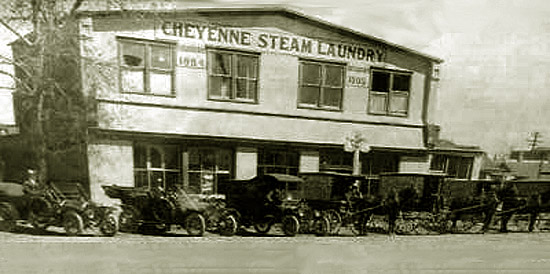
Cheyenne Steam Laundry, Photo by J. E. Stimson, approx. 1910.
The Steam Laundry, corner of 18th Steet and O'Neal, was founded in 1884 by John A. England and was the
first commercial laundry in the Territory. Upon England's death, the business continued to be
operated by his son and a former employee who purchased a half interest in the business.
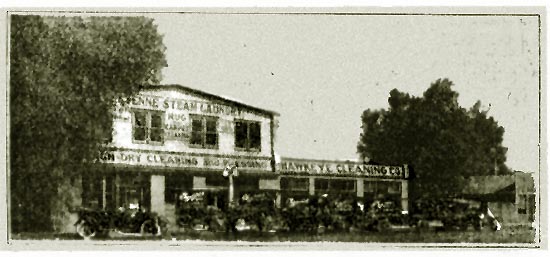
Cheyenne Steam Laundry, 1917.
The laundry was originally in a one-story wooden building which was replaced by the brick building in the above photos. By 1917,
the Hawkeye Cleaning Company was opened in the adjacent building. It was operated separately from the laundry
proper. The washing machines were twice the size of any others in the state. The laundry was also equipped with
rotary hot air dries. The machinery was powered by a 65 hp. steam engine. The building depicted in the above photos burned in 1963 but was replaced by a
newer plant. Records of the Secretary of State indicate that the corporation failed to file its annual
report in 1993 and the corporation as been dissolved. The site was cleared in 1997 but appears on the list of environmentally contaminated sites.
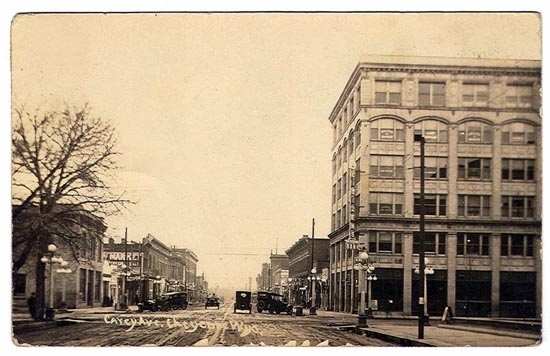
Citizens National Bank Building, Carey Avenue, looking south, approx. 1920. Photo by A. E. Hanna.
Alonzo E. Hanna (1877-1947) was a Blair, Nebraska, photographer. The Citizens National Bank building at 1720 Carey Avenue was constructed in 1912. The
bank went into receivership about 1924. The building was subsequently purchased by Herbert N. Boyd and renamed the H. N. Boyd Building. See discussion lower on page.
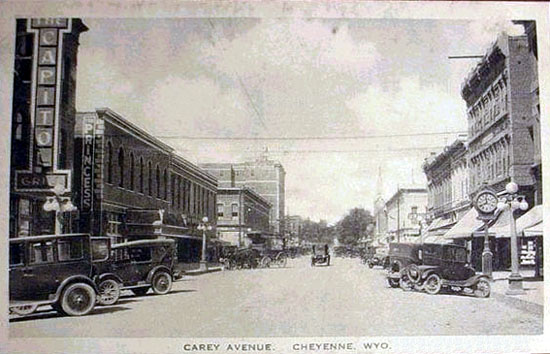
Carey Avenue, looking north from 16th, 1930.
The buildings on the left are gone. In their stead, there is a parking garage.
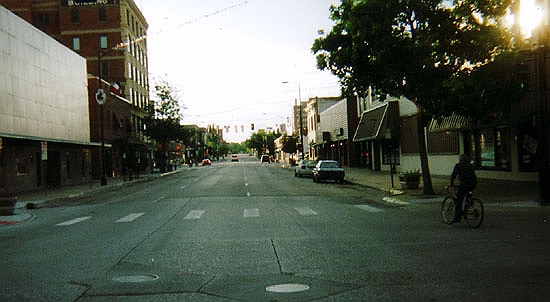
Carey Avenue, looking north from 17th. Photo by Geoff Dobson.
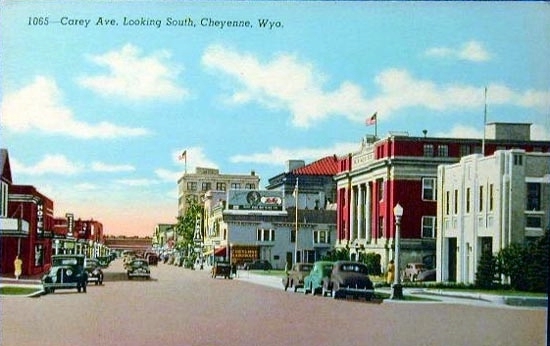
Carey Avenue, looking South, approx. 1941. Photo by William P. Sanborn.
William P. Sanborn (1895-1983) was a Denver photographer who documented Colorado and Wyoming from the late
1920's until the 1960's, first with "realphoto" postcards, later with color lithographed postcards such as the above, and at the
end of his career with colorchrome postcards. His black and white postcards, featured elsewhere on this website, were generally
marked with a script "Sanborn" on the lower right. In a few instances they will be denoted "Sanborn Souvenir Co., Denver" on the
reverse. In practically all instances the postcards and photos are undated and, therefore, dates given for Sanborn photos are
estimates based on postmarks or the contents of the photos themselves. to the left is a close-up of a portion of the street scene taken from
the black and white photograph from which the lithograph was based.
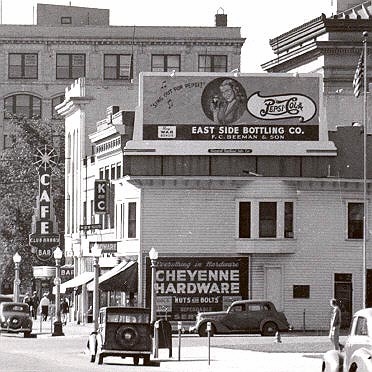 Close-up of portion of Sanborn Photo, Cary Ave., approx. 1941.
Close-up of portion of Sanborn Photo, Cary Ave., approx. 1941.
The red brick building with the Greek Revival columns in the above-photo on the right, is the
City-County Building constructed in 1919. It replaced the original Laramie County Courthouse, on the same site on the northwest corner
of Carey and 19th, razed in 1917. The City-County Building was designed by William R. Dubois, biograhical
information lower on page. The idea of a combined building for both city and county governments was that of the
then Chairman of the Board of County Commissioners, Warren Richardson.
William R. Dubois was born in Chicago. He studied in
Chicago and Omaha, but came to
Cheyenne from Arizona where he practiced architecture. In 1904, he married the granddaughter of Ester Hobart Morris,
the first woman justice of the peace in the United States. Among other buildings
designed by Dubois were the Plains Hotel, the Majestic Building,
the Atlas Theatre on 16th Street, the City-County Building, the Bishop's Mansion,
the Lincoln Theatre and the School District Administration Building (formerly,
Central High School). He also did work for the Swan Land and Cattle Co., Ltd. in Chugwater. Dubois served in the state legislature and was noted as
an accomplished organist.
The H. N. Boyd Building, formerly the Citizens National Bank Building, in the distance was designed by Frederic Hutchinson "Bunk" Porter (1890-1976). Porter
was responsible for a number of inportant buildings in Wyoming including structures at the Cheyenne Transcontinental Airport designed for
Boeing Air Transport, and at the University of Wyoming, Wyoming Hall, the Coe Library, War Memorial Stadium, and the
Western Research Institute Building.
Herbert N. Boyd was in the wholesale cigar and candy business. He also operated three retail stores in Cheyenne at 18th and Carey, 221 W. Sixteenth,
and 308 W. Seventeenth, as well as stores in Sidney, Neb., Greeley, Colo., and
Ft. Collins, Colo. The H. N. Boyd Investment Company survived until the late 1990's.
Next page, The Cheyenne Indians Baseball.
|